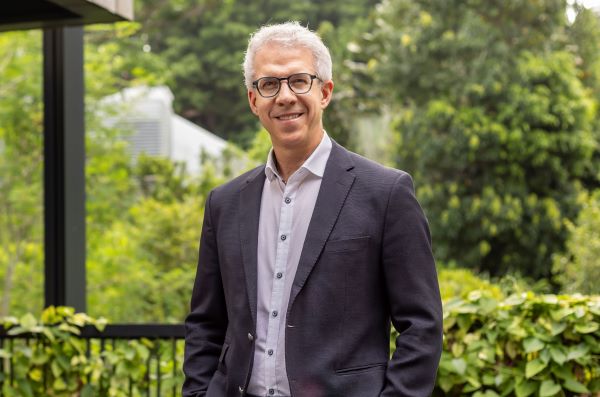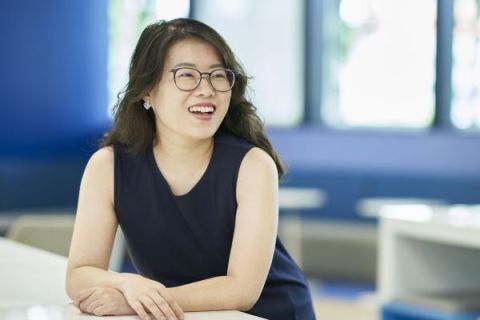
By Alvin Lee
SMU Office of Research Governance & Administration – Interdisciplinary programmes and courses have gained popularity in recent years, reflecting the growing need for complex problem-solving that transcends traditional academic disciplinary boundaries. SMU launched the College of Integrative Studies (CIS) and the College of Graduate Research Studies (CGRS) in 2022 to address the burgeoning demand for interdisciplinary expertise, mirroring global trends.
The interdisciplinary approach is also a key feature of SMU’s School of Social Sciences (SOSS). The Dean of SOSS, Professor Kenneth Benoit, who started his four-year term in August 2024, is focusing on developing four traditional disciplines: political science, psychology, sociology, and philosophy. In turn, that will be applied to the SMU Vision 2025 priority areas of excellence of Digital Transformation, Growth in Asia, and Sustainable Living.
“Those are inherently interdisciplinary themes and topics,” says the Dean. “My goal is to develop coherent work groups that focus on those areas and make sure that we build areas of expertise around those. For example, Southeast Asian studies is an area where we can study Sustainable Living and Growth in Asia. One of our best-known centres, the Centre for Research on Successful Ageing (ROSA), is a good example of such efforts.
“Nurturing these to pursue excellence in a few clearly defined areas and building up faculty who are really excellent in those areas, and encouraging funding applications that span the disciplines, that's my primary goal.”
Professor Benoit is also working to grow SOSS’s expertise and reputation in philosophy, specifically moral philosophy, and “linking it to areas that we teach such as the ethics of sustainability, the ethics of AI, and the issues involved in a world that is undergoing digital transformation in so many new and ethically challenging areas.”
“No university should be without philosophy,” he tells the Office of Research. “No school of social sciences should be without philosophy. You shouldn't have a business school without philosophy. We can't just teach people the practice of business and economics without teaching them ethics. That would be dangerous. Same for law. Same for computing.
“Beyond my four-year term, I would like to see this trend continue and grow. Eventually, I would like to build strong enough patterns with a clear enough mission that I could one day step down as Dean happily and see the whole enterprise continue.”
Computer science x social science = A clearer picture?
It is fitting that philosophy is a key concern for an academic renowned for applying machine learning methods to textual analysis. The title of ‘Professor of Computational Social Science’ conjures up a somewhat paradoxical combination of science and art, with philosophy being the social science discipline that is the least amenable to quantitative methods and assessment.
But is ‘computational social science’ or ‘quantitative social science’ an oxymoron?
“Quantitative social science has existed for a long time – it’s called economics,” deadpans Professor Benoit. “We've used computers to do quantitative analysis for a long time. How much we've trained people in social science disciplines in quantitative methods has depended a lot on the particular discipline.”
The Dean points to psychometrics as “an extremely quantitatively advanced field” and explains how some branches of sociology also feature substantial amounts of statistics and quantitative analysis. However, Professor Benoit concedes that such methods are non-applicable to philosophy because it is “investigating ideas rather than evidence”.
“Political science was next to catch the quantitative wave [after economics],” he adds. “If you open any journal of political science, especially American ones, you'll see tables of statistics.”
The value of a computational approach to political science is amply illustrated by Professor Benoit’s work picking apart the Manifesto Project. He questions the accuracy of “quantitative content analyses of parties’ election programmes” that form the core of the endeavour:
“Content analysis involves learning some structured frame and reading units of text and applying a label using that frame. If you read the sentence, ‘We want to decarbonise by 2030’, you would label that ‘environmental concern positive’. Then you would label the next sentence, and at the end, you would have a series of annotations that followed the scheme and then you could tally them up and turn that into counts.
“A human would have interpreted what the language meant, and they would have assigned a label. That's an exhausting thing to do when you're talking about a 100-page political party programme. If that programme is written in Norwegian, then you have to speak Norwegian. You've got to find a Norwegian political expert.”
Such a solution is “unreliable and doesn’t scale”, Professor Benoit observes. From when he started working on using computers to do textual analysis, to landmark developments such as the natural language processing (NLP) technique Word2vec, textual analysis was revolutionsed by pre-trained transformers such as OpenAI’s ChatGPT (GPT being ‘Generative Pre-trained Transformer’).
Professor Benoit went back to the source of Manifesto Project and ran text through large language models (LLMs) such as ChatGPT, treating it “as if it were a trained, super intelligent, polyglot political expert” and leveraging its computing power with “a series of structured questions through prompt engineering and prompt instruction tuning... to generate quantitative scale questions about specific dimensions of policy, and [turning] that into data.”
The result? “We found that the LLMs perform better than most human experts in the data that they generate.”
The journey to become a computational social scientist
The impressive capabilities of modern LLMs are a far cry from when Professor Benoit was a PhD student living in Eastern Europe studying political transitions after the fall of the Berlin Wall. “Being a quantitative political scientist while… learning the language and doing interviews but also doing statistical analysis made me a bit of a prototype,” he recalls, adding that he had a “slightly schizophrenic, bipolar academic profile”.
“You're in a difficult place because a lot of social scientists would not really understand the value or even the content of what you're doing in computing, and a computer scientist wouldn't take you seriously in any way.”
Starting with Stata – “That's not a language in which anyone should write a text analysis package.” – Professor Benoit moved on to Java, Perl, and Python, which had some packages but “they weren't designed to do what we had been doing in political science in text analysis, which is to turn the qualitative inputs into structured tabular statistical data.”
He explains, “Most of it was based on frequencies of word patterns, word counts, sentence counts, sub-sentence counts. Turning that into tabular information meant that we could suddenly then apply all the statistical analysis to the information that it turned from unstructured qualitative information into structured quantitative information.”
It was at this point that Professor Benoit developed quanteda with Kohei Watanabe, using the R programming language. Professor Benoit and Watanabe, who currently works in Asset Management, actively maintain the package that has become an indispensable tool for textual analysis. Its resounding success in achieving what was intended (“To not need Python.”) reflects the advances the AI field has made as much as it does the work of computational social scientists such as the Dean and colleagues.
Professor Benoit credits the flexibility of the American tertiary education system that had let him explore his cross-disciplinary interests, resulting in a less trodden path that is now acceptable and even desirable, but which is still disincentivised by a traditionally conservative approach to stay within academic disciplines.
“I think what gave me the background that was conducive to this approach was the U.S. system of the undergraduate four-year degree that permits you not only to change your concentration or your major after even a year or two in, but also the high number of electives that it was possible to take; and this is true in the Ph.D. program as well,” muses the Dean, who was an undergraduate business student before switching to a political major, and then taking computer science courses as a postgraduate student. This flexibility is key to avoiding being stuck in the traditional academic silo.
“The world tends to change more quickly than academic programmes change. There's a conservatism in academia that's not found in the world of the free market,” muses Professor Benoit. “What we rely on is people who go up through a very structured, medieval type system of attainment.
“You do an apprenticeship called a PhD, then you have a set of targets to reach tenure, and then you've got your qualification, and then you have to please yet another set of masters to one day get promoted. By the time you've done all that, you've been brainwashed into these narrow straits.”
Growing by doing
Interdisciplinarity is crucial to achieving social impact, notes the Dean, who reiterates the importance of expertise breadth across many disciplines while achieving knowledge depth in each. While acknowledging it might feel rather paradoxical, he is keen to emphasise that building disciplinary excellence should not “silo us into narrow thinking and therefore the inability to solve or address these grand challenges”.
The best way to learn new skills outside of one’s academic discipline? Get your hands dirty, urges the Dean.
“A colleague in the School of Economics asked me, ‘Who does the analysis for your projects?’ And I said, ‘Usually I do. I programme the computer code, analyse the data, and generate the tables.’”
While joking about being “paranoid and having an OCD nature”, Professor Benoit asks the question: “Do you want to just be a conductor, or do you want to play an instrument? If you stop playing an instrument, you lose that skill.
“The best way for me to learn things is to read about them, try them, and then sit down and do them. That's the type of growth that a graduate student would go through. I figured, ‘If I'm a dean and I can do it, anyone can do it.’”
Back to Research@SMU May 2025 Issue
See More News
Want to see more of SMU Research?
Sign up for Research@SMU e-newslettter to know more about our research and research-related events!
If you would like to remove yourself from all our mailing list, please visit https://eservices.smu.edu.sg/internet/DNC/Default.aspx

